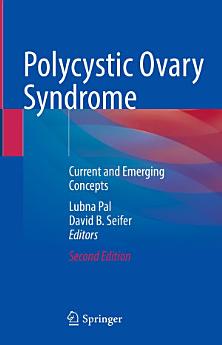Polycystic Ovary Syndrome: Current and Emerging Concepts, Edition 2
About this ebook
All chapters have been updated, with eight new chapters added across seven thematic sections. Part one discusses the epidemiology of PCOS in both adults and adolescents. Part two covers the pathophysiology of PCOS, including genetics, the hypothalamo-pituitary-ovarian and the hypothalamo-pituitary-adrenal axes, insulin resistance, inflammation, and obesity. The next three sections present the various management strategies, medical and surgical, for harnessing the symptomatology, including PCOS-related infertility; these chapters include added case material to provide real-world examples of the treatments in action and their efficacy. Part six covers the comorbidities that women with PCOS commonly encounter, such as issues of mental health, sleep disturbances, endometrial hyperplasia, and cancer, as well as examines the economic burden of PCOS. The final section discusses emerging concepts surrounding possible mechanisms and potential therapeutic approaches to PCOS, including angiogenic dysfunction, the role of vitamin D, future potential therapies to targeted AMH signaling. The closing chapter, by familiarizing the readers with the intergenerational implications ofPCOS and by raising awareness of potential “ripple effects”, aims at alerting the community on a need for vigilance as regards the health of PCOS progeny.
With contributions from leaders in the field, Polycystic Ovary Syndrome, Second Edition remains the gold-standard text on this common medical condition and a valuable resource for the wide range of healthcare professionals engaged in caring for the women with PCOS (including but not limited to reproductive endocrinologists, gynecologists, family physicians, dermatologists, mental health professionals), for the aspiring women's health providers of tomorrow, and for the researchers who are striving to unravel the mysteries of the complex entity that PCOS is.
About the author
Lubna Pal, MBBS, FRCOG (UK), MS, FACOG, Director, Program for Polycystic Ovary Syndrome, Yale Reproductive Medicine, Professor of Obstetrics, Department of Obstetrics, Gynecology and Reproductive Sciences, Yale School of Medicine, New Haven, CT, USA
David B. Seifer, MD, FACOG Yale Reproductive Medicine, Fellowship Director, Division of Reproductive Endocrinology & Infertility, Professor of Obstetrics, Gynecology & Reproductive Sciences, Yale School of Medicine, New Haven, CT, USA





